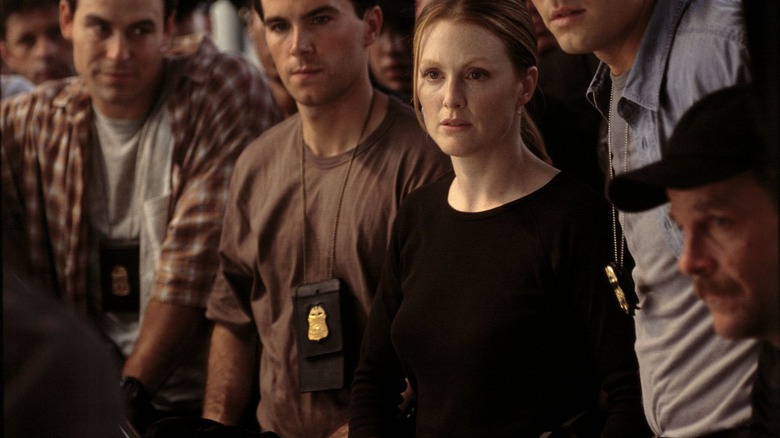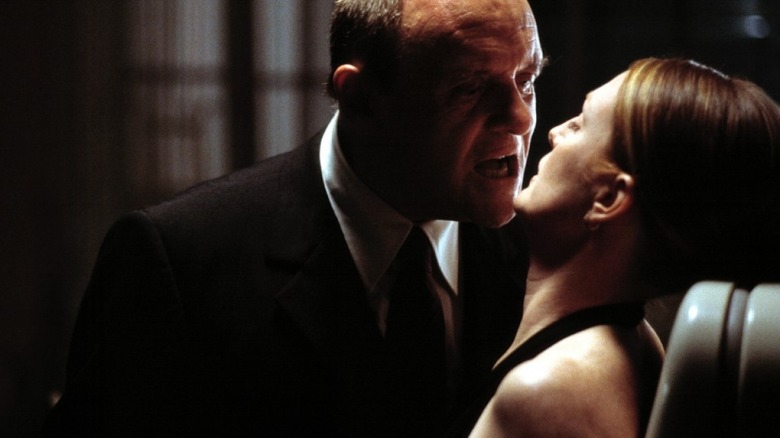How Julianne Moore Really Felt About Replacing Jodie Foster In Hannibal
Julianne Moore is possibly one of the best actresses of her generation, so her casting in Ridley Scott's 2001 horror film "Hannibal" was a little frustrating. "Hannibal" was a decade-later sequel to Jonathan Demme's Academy Award-winning horror powerhouse "The Silence of the Lambs" which starred Anthony Hopkins as the insane cannibal psychiatrist Hannibal Lecter and Jodie Foster as Clarice Starling, the FBI rookie who needed to interrogate him. Foster and Hopkins are both excellent, and both won Oscars for their performances. "Hannibal" catches up with the "Lmabs" characters after Dr. Lecter has been on the lam for a number of years and Agent Starling is blamed for a disastrous botched drug raid. The plot involves one of Hannibal's surviving victims (Gary Oldman) as he plots revenge.
For "Hannibal," Hopkins agreed to return, but Foster didn't, leaving the role of Agent Starling in the hands of Moore. Moore is fine in the role, but most audiences were likely distracted by the mere fact that she wasn't Jodie Foster. This kind of replacement job has to be hard for any actor, as they will likely feel pressured to imitate their forebear but still want to make the role their own.
Talking to Vanity Fair about her career, Moore admitted to feeling a lot of pressure when she took on the role of Clarice Starling. She knew she was capable of delving into the head of a character like Agent Starling, but she also 100% recognized that she was living in the shadow of Jodie Foster who, to repeat it, won an Oscar for the role. Luckily, she had a sympethetic director and an impishly playful co-star to get her through.
Isn't this fun?
Moore was not only aware of the fact that she was replacing Foster but admitted to loving her colleague's work. Her only solution was to stay as far away from imitation as possible. It may have been distracting to audiences, but Moore was going to play the part her own way. Her approach was bolstered by Scott, who was likewise taking over from Jonathan Demme. Scott noted that they weren't remaking an old film. They were making something of their own. Moore said:
"Of course I felt pressure! Jodie Foster is absolutely iconic and is one of my favorite performers ever. And I think the most important thing was not to try to, I'm like, I'm not gonna be Jodie. There's no way. And I'm not in that movie, I'm in this movie. And I think that was something that Ridley made very clear. There are no comparisons. I think Ridley made me feel pretty secure. And you can only do what you can do."
It also helped that Hopkins was there to, essentially, give the production his blessing. There are scenes of gore and horror in "Hannibal," including a scene wherein Ray Liotta is fed portions of his own brain, and Hopkins seems completely at ease. His smiles during a potential stabbing scene went a long way to calm Moore's nerves. She recalled:
"Anthony Hopkins is a brilliant actor, absolutely brilliant, who has a tremendous sense of play. I remember we were doing the scene after the brain-eating scene happens and we're in the kitchen, he's kind of leaning over me, and he's like – he looks like he's gonna stab me and he's threatening me. And he leaned in and goes, 'Isn't this fun?'"
Incidentally, Hopkins and Moore had previously appeared together in the 1996 biopic "Surviving Picasso."

